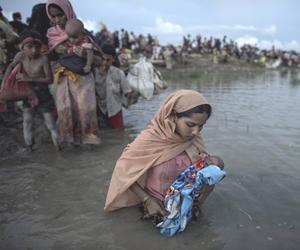Home / News / World News / Article /
UN envoy: sexual attacks against Rohingya may be war crimes
Updated On: 23 November, 2017 11:21 AM IST | United Nations | AP
<p>Widespread atrocities against Rohingya Muslim women and girls have been orchestrated and perpetrated by Myanmar's military and may amount to war crimes, crimes against humanity and genocide, the UN envoy on sexual violence in conflict said today</p>

Widespread atrocities against Rohingya Muslim women and girls have been orchestrated and perpetrated by Myanmar's military and may amount to war crimes, crimes against humanity and genocide, the UN envoy on sexual violence in conflict said today. Pramila Patten, who met many Rohingya victims of sexual violence in Bangladesh camps during a visit this month, said she fully endorses the assessment by UN human rights chief Zeid Ra'ad Al Hussein that Rohingya have been victims of "ethnic cleansing." Patten said at a news conference that the widespread use of sexual violence "was clearly a driver and push factor" for more than 620,000 Rohingya to flee Myanmar. It was "also a calculated tool of terror aimed at the extermination and removal of the Rohingya as a group," she added.

This file photo taken on October 09, 2017 shows Rohingya refugees wading while holding a child after crossing the Naf river from Myanmar into Bangladesh in Whaikhyang on October 9, 2017. US Secretary of State Rex Tillerson said November 22, 2017, that Myanmar's Rohingya population was being subjected to "ethnic cleansing", accusing the security forces of perpetrating "horrendous atrocities" against the Muslim minority. His comments, which come after Tillerson visited Myanmar last week, are the strongest condemnation yet by the United States of the military's crackdown against the Rohingya, which has triggered a major refugee crisis. Pic/AFP




